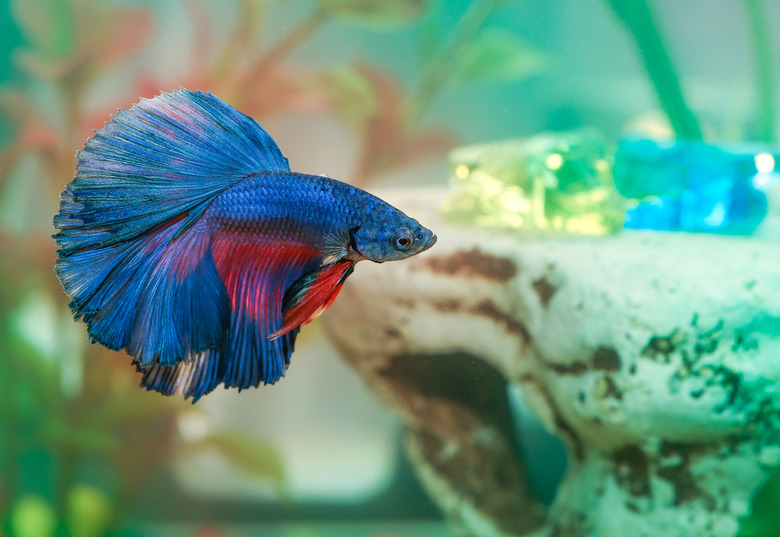How To Entertain Your Betta Fish
Also known as Siamese fighting fish, betta fish are popular pets found in pet stores and home fish tanks everywhere. No one knows what goes on in a betta's mind, but since you are ultimately responsible for your pet's quality of life, err on the side of caution and provide him with plenty of stimulation to ensure he is happy and entertained. Begin by providing your pet with a suitably sized habitat, instead of the tiny flasks in which bettas are often sold. After upgrading the tank, ensure his habitat contains safe items that he can play with, feed him a variety of foods, and learn how to interact with him yourself.
Provide a suitably large aquarium
Provide a suitably large aquarium
While humans often enjoy being a "big fish in a small pond," actual fish rarely agree with this sentiment. Small tanks not only limit your fish to unnaturally small activity areas, but they are also difficult to maintain. You should give your pet minimally a 10-gallon aquarium. Your fish will not only have more room for exercise in a large aquarium, but he will also likely enjoy better water quality, as larger tanks are easier to maintain.
When planning your aquarium, remember too that bettas don't always make good roommates. Male fish will attack each other, fighting to the death. Males will also attack females when breeding season is over. You can house bettas with other docile fish, but avoid other colorful varieties like guppies.
Betta tank ideas
Betta tank ideas
As well as sufficient space, provide your pet with a suitably complex habitat by adding live plants, caves, tunnels, and other items to his tank. These items provide visual barriers, which make your fish feel safer, and they give him something else to look at, smell, and nudge a little. Scientists have shown that fish are smarter than people often give them credit for, and fish raised in stimulating environments are smarter than those raised in bland ones.
Add unusual items to your betta's tank once in a while, as they often serve well as betta toys. If you drop a ping pong ball in his tank, your betta pet will likely investigate, push it around, and attack it. You can also install interesting-looking items on the outside of the tank, such as colorful toys and candles.
Dietary variety is the spice of life
Dietary variety is the spice of life
Feeding your betta stimulating foods will help keep his synapses firing. While you must always keep his nutritional needs in mind, and you should consult your veterinarian before changing his diet, consider offering your pet small insects, shrimp or feeder fish. These small fish have small mouths, so be sure offered food is small enough for your betta to swallow it.
Show some love
Show some love
You can also stimulate your betta's mind by directly interacting with him. For example, you can shine a laser pointer onto the surfaces of his aquarium. By darting the red dot around the tank, you can likely catch your fish's interest and coax him into chasing the mysterious light around the tank. Just be sure to avoid shining the pointer into your pet's eyes.
Alternatively, you can provide him food by placing a small morsel in the end of a drinking straw and then moving it around the tank, so he must "capture" his prey before he can eat. Some fish seem to recognize their owner's voices and will show off a bit for them when they come close to the tank, so talk to your betta and interact with him often.
Teach him tricks
Teach him tricks
You can entertain your fish by teaching him a number of simple tricks, such as swimming through a hoop or flaring on command, by using classical conditioning techniques. For example, begin showing your betta a mirror, which will elicit a territorial response. Repeat this activity for several days; after it becomes routine, try to switch the item that elicits the display to an ordinary item — such as your car keys — by displaying them along with the mirror. With time and repetition, the fish should begin to associate the keys with the need to flare, allowing you to get him to flare by showing him the keys alone.
You can teach your fish to swim through hoops by luring him through the hoop with a piece of food. With time, he may also learn to follow food through simple mazes.
